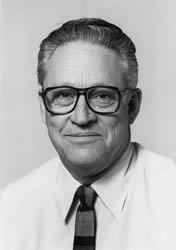

|

|
IN MEMORIAM
Jack A. Howarth
Professor Emeritus of Veterinary Medicine
UC Davis
1922 – 2006
Jack A. Howarth died in his home, in Davis, on November 16, 2006. Dr. Howarth, an internationally recognized authority on infectious diseases of livestock, was a highly respected veterinary clinician, a gifted teacher, and a valued advisor on disease control to the United States and numerous foreign governments.
Jack was born in Manhattan, Kansas, where his father was enrolled in a veterinary school. Jack grew up in Davis and graduated from Davis High School in 1940. He completed his pre-veterinary education at UC Davis and graduated from Colorado State University with a D.V.M. degree in 1944. After a stint in the United States Army and a year in practice, he returned to UC Davis where his father, John A. Howarth, was an extension veterinarian in the Department of Veterinary Science, and enrolled for graduate study in the newly established School of Veterinary Medicine. K. F. Meyer a renowned scientist of the Hooper Foundation, UC San Francisco Medical Center was Jack’s graduate studies mentor. In 1950, Jack was awarded the Ph.D. degree in comparative pathology.
Dr. Howarth was appointed to the founding faculty of the School of Veterinary Medicine, UC Davis in 1950, and served as an ambulatory clinician until 1972. His area of special clinical interest was infectious diseases with an emphasis on swine diseases and their control. He was a demanding, but highly effective and much admired teacher with the ability to show students how basic principles of microbiology, immunology, epidemiology, and ecology relate to practical disease control strategies and methodologies. He was the author of the book, “A Manual of Infectious Diseases,” a primary text for veterinary students for many years. He taught a course on the principles of animal hygiene and disease control to general campus students and a graduate course on the diagnosis and control of foreign animal diseases.
Dr. Howarth conducted research and made important contributions to the control of numerous infectious diseases of livestock including infectious keratitis, leptospirosis, bovine anaplasmosis, epizootic bovine abortion, Nairobi sheep disease, enteroviruses, pseudorabies, and equine rhinopneumonitis. He was the co-author of a paper reporting a study that established that anaplasmosis in cattle was spread naturally by ticks.
Jack’s interests and expertise took him too many countries of the world as a consultant or researcher on infectious livestock diseases. He was a member of a five man team organized by the United States Agency for International Development and the government of Uganda to help increase the livestock production in that country. He returned to Uganda several times including a sabbatical year during which he established a tissue culture laboratory at the Virus Research Institute in Entebbe that studied the virus of Nairobi sheep disease. This work led to the development of a serological diagnostic test and immunizing procedures that were instrumental in the control of this important disease throughout Africa. In addition, Dr. Howarth advised the disease control officials of Uganda, Kenya, and Tanzania on control strategies and lectured at Makerere University in Kampala, Uganda, and at the University of Nairobi, Kenya.
Dr. Howarth also worked with numerous South American countries on programs to enhance their ability to conduct research, improve diagnostic capability and to control infectious diseases of livestock. He was a frequent visitor to Brazil where he advised the government on all aspects of research on infectious diseases, and their diagnosis and control. He played a key role in the establishment of a national veterinary research arm in EMBRAPA, the national agricultural research organization in Brazil. Jack spent six months at the Faculty of Veterinary Medicine, Universidade Federal de Minas Gerais, Brazil where he engaged in teaching, diagnostics and research. His influence also extended to Venezuela, Trinidad, Guyana, Suriname, Barbados, Puerto Rico, Dominican Republic, Haiti, and Jamaica. He was honored by both Brazil and Venezuela for his work.
Because of his extensive knowledge about many infectious diseases of livestock not present in the Unite States, and his hands-on experience with many such diseases where they are throughout the world, United States Department of Agriculture (USDA) veterinarians, frequently sought Dr. Howarth’s advise on strategies to protect domestic livestock from potentially devastating exotic infections. Thus, he was a valuable national resource in this country’s efforts to protect its livestock industry, the food supply and people from dangerous foreign animal diseases. His worldwide perspective of animal disease and his international experience contributed significantly to Dr. Howarth’s effectiveness as a teacher.
Dr. Howarth retired from the University of Davis in 1984, but continued to work as a consultant in the international arena. In his private life, Jack was an avid outdoorsman with a particular love of duck hunting. He was a skilled craftsman; and he built or remodeled the homes in which he resided in. He is survived by his wife Chris; his daughters, Linda Gotfriedson and Shirley Lippis; sons Jack and William and his wife Julie; his sister Dolores Julian Rouard; and stepsons Darrell Padon and his wife Heather, and Jerry Padon and his wife Linda; and five grandchildren.
Murray E. Fowler
William R. Pritchard
Edward D. Rhode